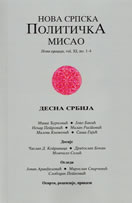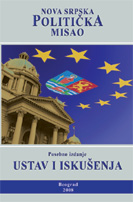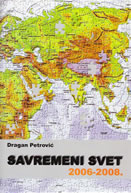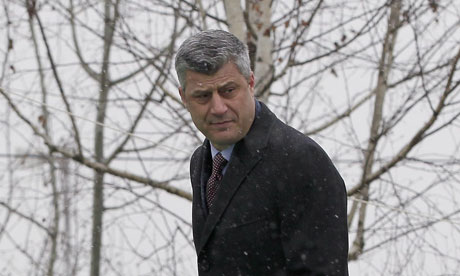| NSPM in English | |||
Report identifies Hashim Thaci as 'big fish' in organised crime |
 |
 |
 |
| уторак, 25. јануар 2011. | |
|
(Guardian, 24 January 2011)
Kosovo's prime minister, Hashim Thaçi, has been identified as one of the "biggest fish" in organised crime in his country, according to western military intelligence reports leaked to the Guardian. The Nato documents, which are marked "Secret", indicate that the US and other western powers backing Kosovo's government have had extensive knowledge of its criminal connections for several years. They also identify another senior ruling politician in Kosovo as having links to the Albanian mafia, stating that he exerts considerable control over Thaçi, a former guerrilla leader. Marked "USA KFOR", they provide detailed information about organised criminal networks in Kosovo based on reports by western intelligence agencies and informants. The geographical spread of Kosovo's criminal gangs is set out, alongside details of alleged familial and business links. The Council of Europe is tomorrow expected to formally demand an investigation into claims that Thaçi was the head of a "mafia-like" network responsible for smuggling weapons, drugs and human organs during and after the 1998-99 Kosovo war. The organ trafficking allegations were contained in an official inquiry published last month by the human rights rapporteur Dick Marty. His report accused Thaçi and several other senior figures who operated in the Kosovo Liberation Army (KLA) of links to organised crime, prompting a major diplomatic crisis when it was leaked to the Guardian last month. The report also named Thaçi as having exerted "violent control" over the heroin trade, and appeared to confirm concerns that after the conflict with Serbia ended, his inner circle oversaw a gang that murdered Serb captives to sell their kidneys on the black market. The Council's of Europe's parliamentary assembly in Strasbourg will debate Marty's findings and vote on a resolution calling for criminal investigations. The vote is widely expected to be passed. Kosovo functioned as a UN protectorate from the end of the Kosovo war until 2008, when it formally declared independence from Serbia. Thaçi, who was re-elected prime minister last month, has been strongly backed by Nato powers. His government has dismissed the Marty report as part of a Serbian and Russian conspiracy to destabilise the fledgling state. However, the latest leaked documents were produced by KFOR, the Nato-led peacekeeping force responsible for security in Kosovo. It was KFOR military forces that intervened in the Kosovo war in 1999, helping to put an end to a campaign of ethnic cleansing by Slobodan Milosevic's Serbian forces. Nato said in a statement tonight that it had instigated an "internal investigation" into the leaked documents, which are intelligence assessments produced around 2004, shortly before tensions with ethnic Serbs fuelled riots in Kosovo.
However, the Nato intelligence reports suggest that behind his role as a prominent politician, Haliti is also a senior organised criminal who carries a Czech 9mm pistol and holds considerable sway over the prime minister. Describing him as "the power behind Hashim Thaçi", one report states that Haliti has strong ties with the Albanian mafia and Kosovo's secret service, known as KShiK. It suggests that Haliti "more or less ran" a fund for the Kosovo war in the late 1990s, profiting from the fund personally before the money dried up. "As a result, Haliti turned to organised crime on a grand scale," the reports state. They state that he is "highly involved in prostitution, weapons and drugs smuggling" and used a hotel in the capital, Pristina, as an operational base. Haliti also serves as a political and financial adviser to the prime minister but, according to the documents, is arguably "the real boss" in the relationship. Haliti uses a fake passport to travel abroad because he is black-listed in several countries, including the US, one report states. Haliti is linked to the alleged intimidation of political opponents in Kosovo and two suspected murders dating back to the late 1990s, when KLA infighting is said to have resulted in numerous killings. One was a political adversary who was found "dead by the Kosovo border", apparently following a dispute with Haliti. A description of the other suspected murder – of a young journalist in Tirana, the Albanian capital – also contains a reference to the prime minister by name, but does not ascribe blame. Citing US and Nato intelligence, the entry states Haliti is "linked" the grisly murder, going on to state: "Ali Uka, a reporter in Tirana, who supported the independence movement but criticised it in print. Uka was brutally disfigured with a bottle and screwdriver in 1997. His roommate at the time was Hashim Thaçi." Haliti is also named in the report by Marty, which is understood to have drawn on Nato intelligence assessments along with reports from the FBI and MI5. Marty's report includes Haliti among a list of close allies of Thaçi said to have ordered – and in some cases personally overseen – "assassinations, detentions, beatings and interrogations" during and immediately after the war. Haliti was unavailable for comment. However, in an interview with the media outlet Balkan Insight last week he dismissed the Marty report as "political" and designed to "discredit the KLA". "I was not surprised by the report. I have followed this issue for years and the content of the report is political," he said. But he accepted that the Council of Europe was likely to pass a resolution triggering investigations by the EU-backed justice mission in the country, known as EULEX. "I think it's a competent investigating body," he said, "It's a European investigation body. I think that there is no possibility that EULEX investigation unit to be affected by Kosovo or Albanian politics." Responding to the allegations in the NATO intelligence reports tonight, a Kosovo government spokesman said: "These are allegations that have circulated for over a decade, most recently recycled in the Dick Marty report. They are based on hearsay and intentional false Serbian intelligence. "Nevertheless, the prime minister has called for an investigation by EULEX and has repeatedly pledged his full cooperation to law enforcement authorities on these scandalous and slanderous allegations. "The government of Kosovo continues to support the strengthening of the rule of law in Kosovo, and we look forward to the cooperation of our international partners in ensuring that criminality has no place in Kosovo's development." Road to Strasbourg It has taken more than two years for an inquiry into organ trafficking in Kosovo to reach the Palace of Europe, a grand building in Strasbourg that serves as the headquarters of the Council of Europe. The formal inquiry into organ trafficking in Kosovo was prompted by revelations by the former chief war crimes prosecutor at The Hague, Carla Del Ponte, who said she had been prevented from properly investigating alleged atrocities committed by the Kosovo Liberation Army. Her most shocking disclosure – unconfirmed reports the KLA killed captives for their organs – prompted the formal inquiry by human rights rapporteur Dick Marty. His report, published last month, suggested there was evidence that KLA commanders smuggled captives across the border into Kosovo and harvested the organs of a "handful" of Serbs. His findings, which will be subject to a parliamentary assembly vote tomorrow, went further, accusing Kosovo's prime minister and several other senior figures of involvement in organised crime over the last decade. http://www.guardian.co.uk/world/2011/jan/24/hashim-thaci-kosovo-organised-crime |
Од истог аутора
Остали чланци у рубрици
- Playing With Fire in Ukraine
- Kosovo as a res extra commercium and the alchemy of colonization
- The Balkans XX years after NATO aggression: the case of the Republic of Srpska – past, present and future
- Из архиве - Remarks Before the Foreign Affairs Committee of the European Parliament
- Dysfunction in the Balkans - Can the Post-Yugoslav Settlement Survive?
- Serbia’s latest would-be savior is a modernizer, a strongman - or both
- Why the Ukraine Crisis Is the West’s Fault
- The Ghosts of World War I Circle over Ukraine
- Nato's action plan in Ukraine is right out of Dr Strangelove
- Why Yanukovych Said No to Europe

.jpg)








 Kosovo's Prime Minister Hashim Thaci identified in secret Nato reports as having involvement in criminal underworld.
Kosovo's Prime Minister Hashim Thaci identified in secret Nato reports as having involvement in criminal underworld. In the documents, Thaçi is identified as one of a triumvirate of "biggest fish" in organised criminal circles. So too is Xhavit Haliti, a former head of logistics for the KLA who is now a close ally of the prime minister and a senior parliamentarian in his ruling PDK party. Haliti is expected to be among Kosovo's official delegation to Strasbourg tomorrow and has played a leading role in seeking to undermine the Marty report in public.
In the documents, Thaçi is identified as one of a triumvirate of "biggest fish" in organised criminal circles. So too is Xhavit Haliti, a former head of logistics for the KLA who is now a close ally of the prime minister and a senior parliamentarian in his ruling PDK party. Haliti is expected to be among Kosovo's official delegation to Strasbourg tomorrow and has played a leading role in seeking to undermine the Marty report in public.












